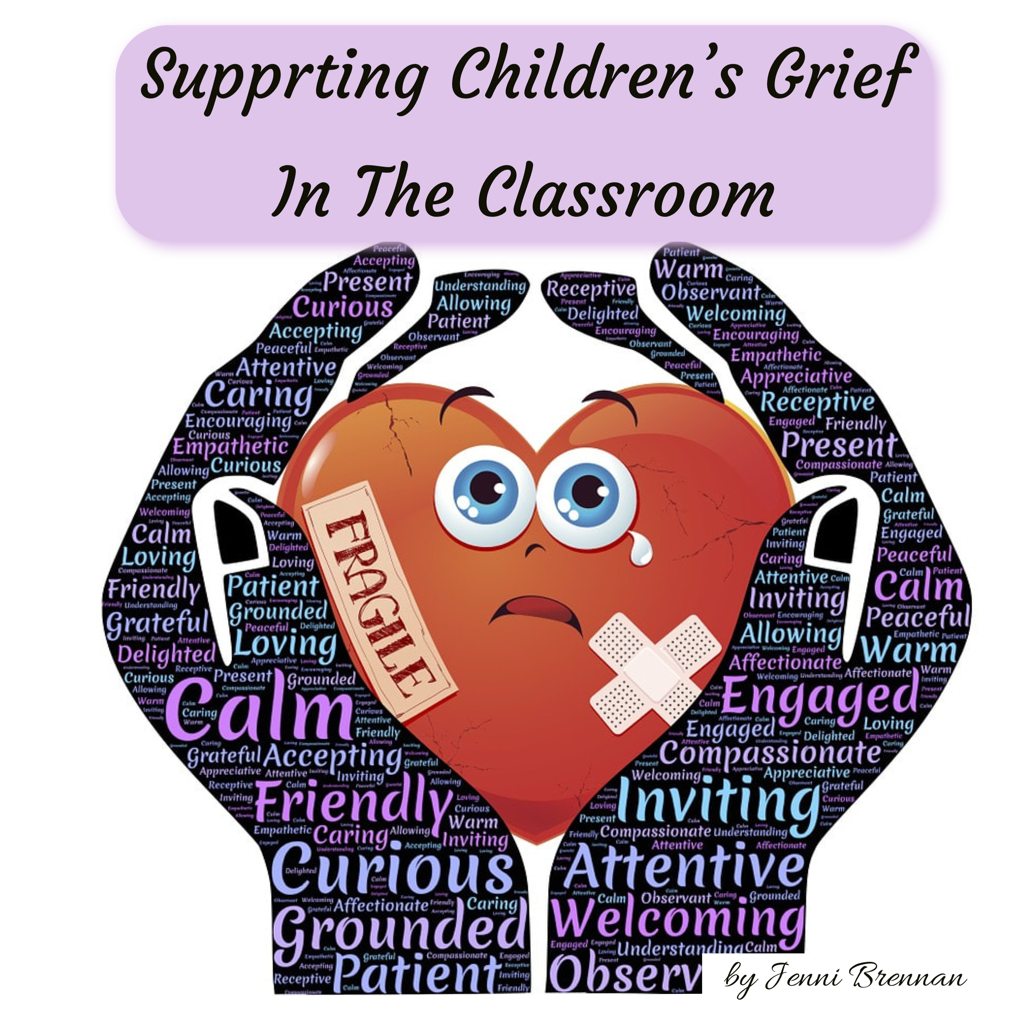|
Are you a teacher, school administrator or school support personnel? If so, think back over the past three years. How many times has a student in your school lost a parent, sibling or significant family member? How many times has your school community lost a student or a teacher? Chances are fairly high that every single one of you could think of at least one instance where grief reared its ugly head in your school.
Now, think back to your professional training experiences. How many courses did you take about the psychology of grief, common grief counseling interventions or how to support grief inside the classroom? How many grief courses were required for your professional licensure? For most of you, the answer to both questions is probably "none." The statistics regarding children's grief in schools are staggering. According to Comfort Zone Camp, one out of every 7 Americans will lose a sibling or a parent before the age of 20. That's 15% of children under age 20. Yet, it's not unusual for teachers to feel completely unprepared when it comes to supporting a grieving child in their classroom. Teachers are with our children 5-6 hours each day, 5 days each week, 9 months a year. They are the frontlines of support in the classroom for grieving children yet we arm them with few resources and guidance on what to do and what not to do. For many people, things that make us uncomfortable or cause us to feel inadequate and unprepared often become things we avoid. It seems like this holds true for many teachers and schools across America. Grief is not discussed in many classrooms. Most classroom libraries probably do not have books on death, loss or grief. Group discussions after a death strikes a classroom are likely a rarity. Teachers surely make referrals to the school social worker (if one exists in the building) and figure that it's probably best to not mention the loss to the grieving child or to their peers. After all, they don't want to make their students hurt even more. But, the silence many grieving children receive from their schools following a loss can be deafening. Below are some tips to help teachers and districts begin to improve their ability to provide support to grieving children within the classroom. Remember, nearly 15% of your students are likely to experience a significant loss before they reach the age of 20. How to Support Children’s Grief in the Classroom 1. Reach out Perhaps the most important suggestion I can offer is to take an active role. When you hear of a child's loss, reach out. You will not be inconveniencing the family. You will not be a bother to them. Your genuine concern and offer of support could be something that is remembered forever. While you cannot take away that student's loss, by reaching out you are telling them and their family that they are important to you and that they are valued members of the school community. You don't have to offer anything - just your acknowledgement of their loss and validation of their worth is important enough. 2. Share accurate information In today's super connected society, news travels at lightening fast speeds. One Facebook or Twitter post can notify a whole community of a death in just a few moments. Sometimes the information that gets circulated is based on speculation and is inaccurate. One of the best ways to address this issue is to formally share the information with the correct details. Ask the student's family what information they would like shared and if they would like someone from the school to share it with the school community. Imagine the stress a student may feel returning to school but not knowing who knows about their father's death. Who do they have to tell? What do they need to say? When someone from the school takes that pressure away from the family and child, they take away what can be a very heavy burden. 3. Involve peers No matter the grade, one of the most important aspects of any child's school experience is their relationship with their peers. When a student loses a family member, it is important for their peers to not just be notified but to be provided with an opportunity to explore the loss themselves. Perhaps their friend's now deceased parent used to volunteer on Field Day or helped out in a carpool or came to school on the student's birthday each year. For many children, seeing a peer lose an important family member can also trigger worries about the possibility of losing their own loved one. That math unit can wait a day while classrooms take an hour to allow the peers to ask questions, support each other and perhaps even identify a way to help their peer. 4. Formally commemorate Most schools value formal ceremonies. School concerts, school plays, pep rallies, academic assemblies, holiday gatherings and graduations are common occurrences in schools. Why? Because they bring the community together, reinforce the concept of interconnectedness and allow for shared experiences. Schools should not be saving these formal gatherings only for positive moments. During times of grief, schools can find a way to bring everyone together to commemorate the loss of a member of their own community. Some schools plant a tree, install a bench or hold a naming ceremony when the community experiences a significant loss. Formal commemoration activities can also be done on a smaller scale. Perhaps the student's classmates could put together a book of poems, cards or pictures that the students create and then give the book to the grieving child and family (teachers and parents should proof it first though!). 5. Be flexible For many children, returning to school provides them with security, structure and safety. It is not uncommon or abnormal for a child to want to go to school the very next day after they have had a loss. School can provide grieving children with an opportunity to be distracted from the loss and sadness for short periods of time. It can allow them to feel normal and feel a connection to the life had prior to the loss. But, for many students, there are moments in the school day when they may find it challenging to focus, attend to a task or even sit still. Be flexible with children, regardless of their age, when it comes to their coursework after the loss. Accommodations such as extending deadlines and allowing extra bathroom breaks will probably not ruin the child academically. However, setting rigid standards, being inflexible or accusing children of taking advantage of their grief situation may set children back academically, socially and emotionally. Yes, I am even suggesting applying this same flexibility to teens. 6. Resist the urge to share and compare While you may have had a similar loss as a child, it is not always helpful to share such experiences with a grieving child. It can potentially minimize their experience and loss. The same holds true to statements like "I lost my Dad too. I know how it feels." The truth is that no two people experience loss and grief in the same way. Avoid sharing and comparing your own experiences and focus instead on providing genuine support. 7. Anticipate re-grieving Many adults who have experienced a loss can appreciate that there are certain times of the year where their grief gets re-triggered. Anniversaries of the death, certain holidays and birthdays are all common events that can cause a surge in grief. Children experience this same phenomenon but they also have an added layer of complexity in their grief. As children develop cognitively, emotionally and socially, they begin to understand and view their world differently. They start to apply different questions and interpretations to their world and to any losses they may have had. So, while your 6th grade student may have lost their sister in the 2nd grade, they may re-grieve that loss in completely new terms as they begin to see the world through 6th grade eyes. For them, it could feel as if the loss is brand new. 8. Track community losses Schools and school districts should consider tracking data around grieving children - even if it is only for certain losses such as parents or siblings. Tracking this data will allow districts and schools to identify patterns that are out of the ordinary. For example, if your small elementary school has 9 students who have lost a parent in a span of 2 years, your school may want to explore the possibility of offering more specific resources for those students and families as well as the rest of the school community. That's a lot of grief to be experiencing for one school in one short period of time. 9. Support the staff Let's face it, being a teacher is one of the hardest jobs out there. Teachers are tasked with an immense amount of goals, objectives and responsibilities without an immense amount of funding or resources. While grief can enter the classroom through the experiences of the students, it can also enter the classroom through the experiences of the school staff. Teachers, administrators and staff members all also encounter loss and may be actively grieving alongside the grieving children in the school. Explore ways to come together to support each other as professionals. 10. Provide support over time There is no timeline for grief. There is no such thing as closure. When people lose someone important to them to death they don't ever get over it. Grief is with them forever and while sometimes it's a silent companion, other times it's a loud, unruly, disruptive companion who is difficult to manage. Just as grief will exist over a long time frame, so too should the support from the school. Check in frequently with the student to see what they need, not just in the days and weeks immediately following the loss but in the months and years after the loss as well. If you are interested in receiving additional training and education on the topic of supporting children's grief in the schools, be sure to visit Children & Grief: Guidance and Support Resources from Scholastic/New York Life for helpful resources such as lesson plans, handouts and training modules. Also explore the website for the National Alliance for Grieving Children for additional training resources and to identify children's grief centers in your area. If you are in the Massachusetts area and would like to arrange for a grief/bereavement in-service in your school, please send an email to me at [email protected] for more information.
0 Comments
|
GriefGrief is everywhere for all of us - yet our society does a poor job allowing people to grieve. It is ok to grieve and it is normal to struggle with how to continue living your life while dealing with grief. Archives
June 2023
Categories
All
|
Sign Up For the Changing Perspectives Newsletter
Changing Perspectives with Jenni Brennan is supported by its audience.
When you purchase through links on this site, an affiliate commission may be earned. Learn More.
When you purchase through links on this site, an affiliate commission may be earned. Learn More.
Changing Perspectives Copyright © 2023


 RSS Feed
RSS Feed
